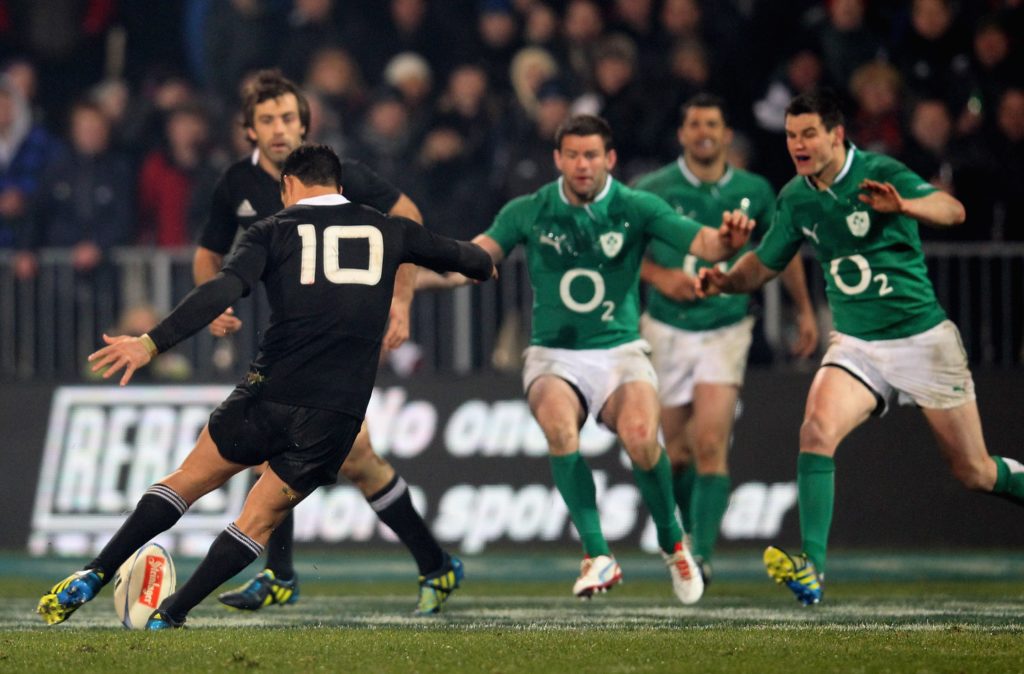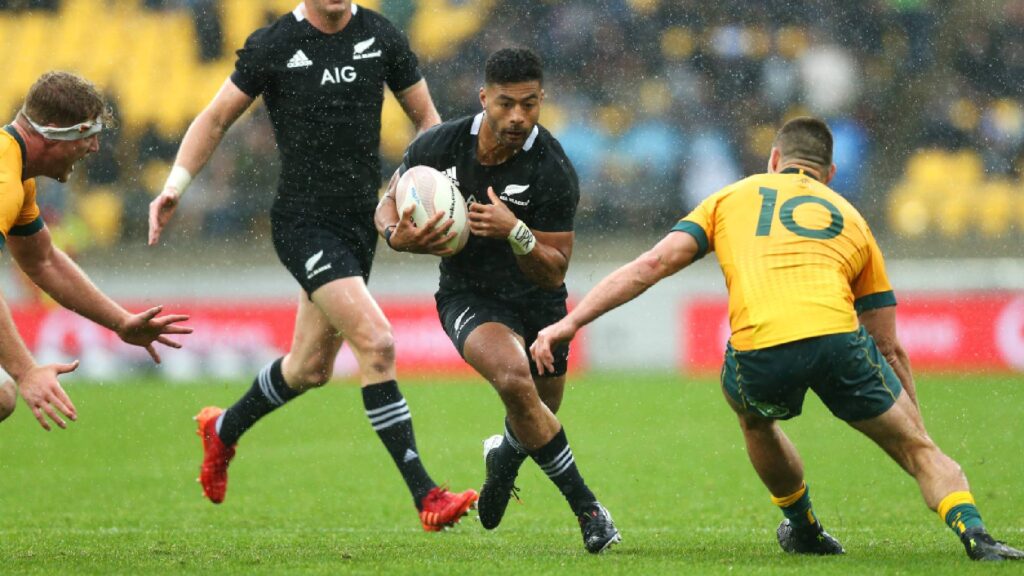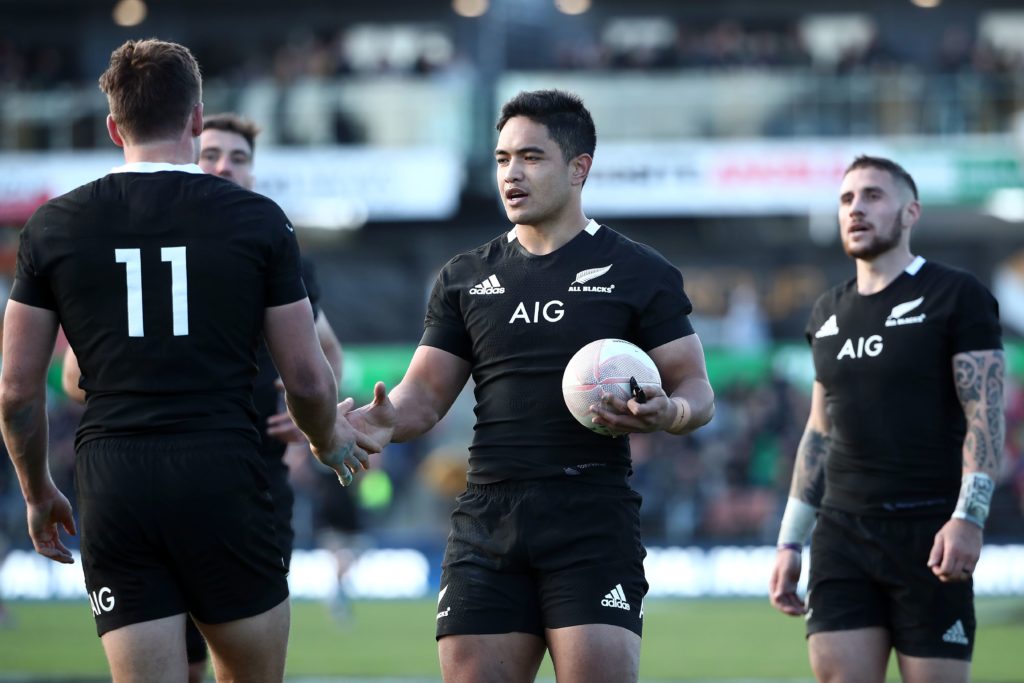New Zealand clearly does boom-bust cycles when it comes to their No 10s. In 2011 they went to a World Cup with just one genuine test first-five, albeit he was arguably the greatest in history. Four years later they were sifting through six options, all of whom probably could have won the All Blacks the World Cup.
This crazy supply line saw Daniel Carter finish his career in 2015 as World Player of the Year – sparking everyone to say the All Blacks would be in trouble having to organise themselves without him, only for Beauden Barrett to slip into the role and finish 2016 as World Player of the Year.
He pulled off the same feat in 2017, a year in which, again, it appeared New Zealand had a cupboard-full of quality play-makers.
There was Barrett and Lima Sopoaga. Richie Mo’unga had just led the Crusaders to the Super Rugby title and Damian McKenzie was poised to blossom with the Chiefs. Stephen Perofeta played against the Lions for the Blues and showed a couple of magical touches that boded well and so no one needed to be too upset that Aaron Cruden, after winning his 50th test cap, was heading off to Montpellier.
As 2021 looms, the landscape looks decidedly barren again. The cycle is bust.
But as 2021 looms, the landscape looks decidedly barren again. The cycle is bust. Barrett will be in Japan during Super Rugby and while the coaching fraternity say this is a golden opportunity for someone else to haul their light out from under the bushel, the prospect of anyone actually doing so looks remote.
New Zealand’s current crop of first-fives does not strike as being vintage. There is the world-class Mo’unga – a man who has steered the Crusaders to four successive Super Rugby titles but who is still, to some degree, finding his feet at test level.
And there is Barrett – the extraordinarily talented visionary who is brave enough to try almost anything on attack.
But other than those two, New Zealand is not blessed. If one or both of Barrett or Mo’unga should slip in the shower one day next year and do themselves some damage, New Zealand would be wound up into quite the state trying to find replacements.

McKenzie has played a test wearing No 10 and while that went well enough, it was two years ago and since then, he’s almost exclusively been used at fullback by the Chiefs and the All Blacks.
He came through schoolboy rugby in Christchurch as a No 10, started life with Waikato as a No 10 but once he hit the full-time professional ranks he was shifted to fullback.
It was always sold as temporary and for a brief period in 2018 it looked like he was finally going to be given his chance to play at No 10 for the Chiefs and off the bench for the All Blacks. But it turned out he had come to prefer fullback having spent to much time playing there and that all of his coaches agreed that was his future.
He was once a 10 forced to play fullback, now he’s a fullback who might, at a push, be considered well enough equipped to cover 10. Bottom line is this – strike him off the list as someone who the All Blacks are developing as a genuine play-maker from first receiver.
Richie Mo’unga, a man who has steered the Crusaders to four successive Super Rugby titles, is still, to some degree, finding his feet at test level.
Josh Ioane is the other Super Rugby player to have played at No 10 for the All Blacks – Jordie Barrett has too but that was a one-off at the World Cup and not a serious option to develop.
Ioane is obviously talented – that was impossible to miss in the way he played for the Highlanders in 2019.
But having won a solitary cap last year, he didn’t build on it in 2020 and there are fundamental questions to be answered about whether he has the patience and all round tactical vision to manage the All Blacks through a tight test.
At the moment he seems like a good player, but has only reached the mezzanine floor that sits between Super Rugby and the All Blacks.

And that’s it in terms of those playing Super Rugby next year who have previous test exposure. Perofeta has been riddled with injury and now seems destined to play more at fullback. His Blues team-mate Otere Black has advanced in the last two years but only to the point where he looks a tidy and organised Super Rugby option.
With no Barrett around, 2021 looms as make or break for Black – the year in which he either lifts his game and proves he can make the next level or the one where he, or more pertinently All Blacks coach Ian Foster, decides it’s simply not going to happen. This will be Black’s seventh Super Rugby season and that is more than enough time to make a definitive assessment.
Kaleb Trask at the Chiefs has spent most of the Mitre 10 Cup at fullback and with Bryn Gatland having shifted to Hamilton, the former may now also be committed to the backfield which seems increasingly to be the case with Mitch Hunt at the Highlanders, too.
And with so many prospects now eager to play at fullback and genuine doubts hanging over those such as Black and Ioane who have committed to playing first-five, the All Blacks will have issues if something happens to either Barrett or Mo’unga.
With so many prospects now eager to play at fullback and genuine doubts hanging over those such as Otere Black and Josh Ioane who have committed to playing first-five, the All Blacks will have issues if something happens to either Beauden Barrett or Mo’unga.
But then the landscape didn’t appear so different in 2021 either. Back then there was daylight between Carter and the chasing pack and little confidence that the lead hopefuls Colin Slade and Cruden would close the gap.
Things changed quickly though that year. They changed throughout that cycle. Cruden relished being reunited with his former Manawatu mentor Dave Rennie at the Chiefs and they combined to win their first Super Rugby title.
Cruden was hesitant and uncertain at times in 2010 and 2011 but in 2012 he clicked into his natural groove and suddenly started slicing defences and booming the ball around the field.

His shift to the Chiefs also opened the door for Barrett to come through at the Hurricanes. He was a name no one knew at the start of 2012, something that changed dramatically as the months ticked by.
At the Crusaders an opportunity arose for Tom Taylor to show what he could do in the absence of Carter, who missed the start of the Super Rugby season. He was remarkably calm, polished and accurate.
Slade rebuilt his confidence in 2013 after a horror run of injuries that saw him break his ankle and jaw twice and the arrival of Tony Brown at the Highlanders coaxed the best out of Lima Sopoaga.
So perhaps a similar story may develop in 2021. Brown, having taken over as head coach of the Highlanders, may be able to give Ioane the finesse and control he needs to nudge himself up that last step.
Clayton McMillan will be at the Chiefs where he might decide to install Trask as his play-maker and give him the tools he needs to establish himself.
Maybe all Black needs is more time in the role – a full, injury-free campaign with the Blues – a rejuvenated and organised Blues, that is.
And what about Jackson Garden-Bachop at the Hurricanes? Could he be the unexpected riser in 2021? He developed in the veritable leaps and bounds in 2020 after seemingly being stuck in a rut.
The picture is relatively bleak but history has shown how quickly that can change.



Comments
Join free and tell us what you really think!
Sign up for free